Find thoughtful gifts for every occasion here.

Vitamin D Uncovered: Why This Sunshine Supplement Matters Year‑Round
Learn why many people remain Vitamin D deficient even on sunny days—and explore five versatile supplements that can restore your energy, mood, and immune health
5 min read
Stepping outside into a sunny day can feel like a quick boost of energy and warmth. But for many of us—especially those working 9 to 5 indoors—that moment of sunshine is brief. Even in spring or summer, most of our skin stays covered or shaded, our daily schedules dominated by artificial lighting and filtered daylight. Modern life has fundamentally changed how we interact with the sun, and our bodies are quietly paying the price.
Despite the increasing awareness of wellness and healthy habits, a large percentage of adults still test low or borderline deficient in Vitamin D. Low levels often go unnoticed, manifesting as vague symptoms: sluggishness, frequent colds, muscle aches, even mild depression. Over time, that lack of Vitamin D wears away at your resilience—leaving you more vulnerable to illness, slower to recover from workouts, and prone to seasonal mood dips.
That’s why supplementation has become more than just a winter solution. It’s a daily ritual many rely on to bridge the gap between lifestyle and biology. Depending on your preferences, you might favor a quick spray, a softgel, a vegan tablet, or a precise liquid drop. Below, we’ve selected five of the best in-stock Vitamin D supplements to help you choose the right format, dose, and delivery method to support your body’s needs all year long.
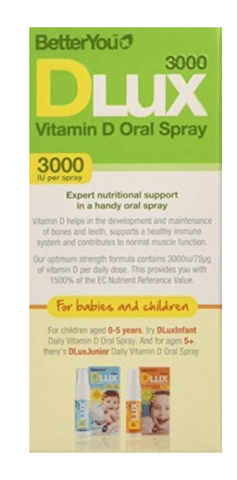

BetterYou’s DLux 3000 is a peppermint‑flavored oral spray delivering 3,000 IU of Vitamin D₃ per two pumps. Designed for direct absorption through the mouth’s mucous membranes, it bypasses the digestive tract entirely. This makes it especially useful for anyone with digestive issues, variable meal schedules, or difficulty swallowing pills. The slim 15 ml bottle tucks neatly into a purse or pocket, encouraging consistent use during busy days or travel.
Pros:
By absorbing under the tongue, it offers faster and more reliable uptake than many capsule-based supplements.
Its discreet design and pleasant mint flavor make it easy to incorporate into both morning and midday routines.
Eliminates the need to swallow pills, ideal for those with gag reflex concerns.
Cons:
The plastic pump mechanism isn’t recyclable, which may bother eco‑minded users.
Accurate dosing depends on careful counting of sprays, introducing room for small dosing errors.
A few users note a slight tickle or cooling sensation in the throat immediately after spraying.
Price: £7 for 15 ml (≈ $9 USD)
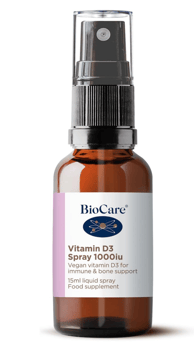

Bio‑Care’s vegetarian capsules each deliver 1,000 IU of pure Vitamin D₃ sourced from sustainable lichen. Encased in hypoallergenic, plant‑based capsules, this option is free from dairy, gluten, soy, and artificial additives—perfect for sensitive or allergy‑conscious users. The small, easy‑to-swallow capsules suit anyone who wants a straightforward, daily maintenance dose without complicated regimens.
Pros:
The gentle, moderate dosage minimizes risk of over‑supplementation and supports steady level maintenance.
A clean formulation without additives makes it safe for people with multiple dietary restrictions.
Swallowing a small capsule is quick and can easily become part of a morning or evening routine.
Cons:
To correct a significant deficiency, you may need to take multiple capsules daily, increasing cost and pill burden.
Absorption relies on healthy digestion and concurrent dietary fats, so variable gut health may affect efficacy.
Lacks immediate sensory feedback—some users miss the “ritual” feel of a spray or liquid drop.
Price: £9 for 60 capsules (≈ $11 USD)
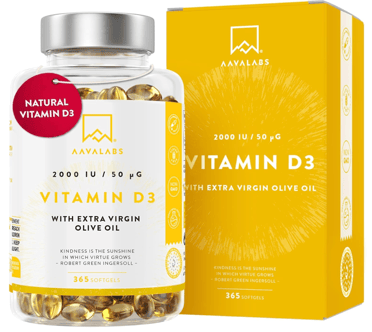

AAVALABS combines premium ingredients by suspending 2,000 IU of Vitamin D₃ in cold‑pressed extra‑virgin olive oil within each vegetarian capsule. This oil-based delivery mirrors how nutrients are naturally absorbed from food, promoting a steady release into your bloodstream over several hours. With only one capsule needed per day for maintenance, it simplifies routines while offering a meaningful dose for those wanting a bit more support than low‑dose options.
Pros:
The olive oil carrier enhances and prolongs absorption, reducing peaks and troughs in blood levels.
Only one capsule per day is required, making adherence straightforward compared to multi‑pill regimens.
Vegetarian and gluten‑free formulation suits a broad range of dietary needs.
Cons:
The larger capsule size can present a swallowing challenge for individuals sensitive to pill size.
Fixed 2,000 IU dosing offers less fine‑tuning than liquids or sprays, which can adjust by drops or sprays.
If taken on an empty stomach, the oily base may leave a mild aftertaste or minor stomach discomfort.
Price: £15.29 for 365 capsules (≈ $19 USD)
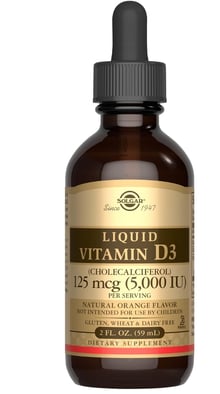

Solgar’s liquid comes in a 59 ml amber glass bottle with an easy‑use dropper that delivers 2,500 IU of Vitamin D₃ per 1 ml dropperful. Suspended in MCT oil, it ensures efficient uptake and gives you full control over dosing—perfect for adapting intake to seasonal needs, age, or specific health goals. The light orange‑flavored formula makes it pleasant straight or mixed into a drink.
Pros:
Precision dosing via dropper allows customization from very low to therapeutic levels, ideal for families.
Eliminates the need for swallowing pills altogether, supporting users of all ages and preferences.
Amber glass protects the oil from light, preserving potency over many uses.
Cons:
Measuring exact doses takes practice—over‑ or under‑pouring by a fraction can change your intake significantly.
The glass bottle is more fragile and less portable than plastic alternatives, risking breakage.
The mild orange flavor may taste out of place if taken without dilution or food.
Price: £12 for 59 ml (≈ $15 USD)
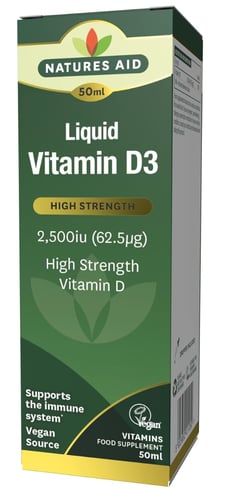

Natures Aid offers a plant‑based liquid Vitamin D₃ solution, sourcing its 2,500 IU per 1 ml dropper from vegan‑friendly lichen and suspending it in fractionated coconut oil. Each 50 ml bottle lasts 50 days at a 1 ml daily dose, making it both cost‑effective and simple to manage. The coconut oil base delivers a subtle, natural taste and aids in fat‑soluble absorption.
Pros:
A true vegan source of Vitamin D₃ expands options for those avoiding animal‑derived ingredients.
One daily dropper makes dosage simple and consistent without measuring multiple drops.
Coconut oil carrier is light and generally well-tolerated, supporting efficient absorption.
Cons:
The fixed 1 ml dropper dose lacks the micro‑dosing flexibility of smaller‑volume droppers.
Coconut oil flavor can be noticeable and may not pair well with certain morning beverages.
Glass dropper bottles require careful handling and aren’t ideal for active travel.
Price: £10 for 50 ml (≈ $12 USD)
Final Thoughts
When our schedules and environments limit natural sun exposure, structured supplementation becomes essential to keep Vitamin D levels optimal. Each of these five supplements addresses absorption, convenience, and dietary preferences in unique ways—from the rapid uptake of a spray to the precise control of liquid droppers, the simplicity of capsules, and the sustained release of oil‑based softgels.
To choose wisely, consider how you live: if you’re frequently on the move, a compact spray or dropper may suit you best. For a streamlined daily habit, a single‑capsule formula like AAVALABS’ 2,000 IU or Bio‑Care’s gentle 1,000 IU could fit seamlessly. Those needing seasonal correction under guidance might opt for higher‑potency liquids or tablets.
Pair whichever supplement you select with safe sun exposure, a balanced diet, and periodic blood‑level testing. Doing so will not only support your immunity and muscle health but also uplift your energy and mood—helping you carry a bit of sunshine with you every day.
